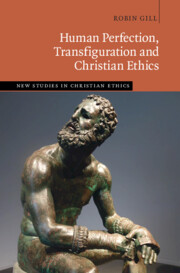Book contents
- Human Perfection, Transfiguration and Christian Ethics
- Reviews
- New Studies in Christian Ethics
- Human Perfection, Transfiguration and Christian Ethics
- Copyright page
- Contents
- Acknowledgements
- Introduction
- Part I Human Perfection
- Part II Jesus’ Perfection
- Chapter 5 Be Perfect, as Your Heavenly Father Is Perfect
- Chapter 6 Was Jesus Perfect?
- Part III Transfiguration and Global Perfection
- Select Bibliography in Christian Ethics
- Index
- Titles Published in the Series (continued from page )
- References
Chapter 5 - Be Perfect, as Your Heavenly Father Is Perfect
from Part II - Jesus’ Perfection
Published online by Cambridge University Press: 09 May 2024
- Human Perfection, Transfiguration and Christian Ethics
- Reviews
- New Studies in Christian Ethics
- Human Perfection, Transfiguration and Christian Ethics
- Copyright page
- Contents
- Acknowledgements
- Introduction
- Part I Human Perfection
- Part II Jesus’ Perfection
- Chapter 5 Be Perfect, as Your Heavenly Father Is Perfect
- Chapter 6 Was Jesus Perfect?
- Part III Transfiguration and Global Perfection
- Select Bibliography in Christian Ethics
- Index
- Titles Published in the Series (continued from page )
- References
Summary
Chapter 5 turns, at last, to the more conventional resource for Christian ethics, namely the Bible. It looks specifically at the way that teleios and teleioö (adjective and verb) are used thrice each in Matthew, in Paul and in Pauline letters, but most frequently in Hebrews where Jesus is seen as being perfect and without sin and in the Septuagint variously depicting human, and more occasionally divine, perfection.
Keywords
- Type
- Chapter
- Information
- Human Perfection, Transfiguration and Christian Ethics , pp. 101 - 118Publisher: Cambridge University PressPrint publication year: 2024



